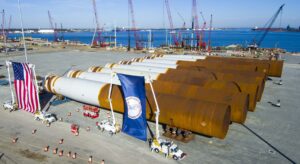Dominion Energy Virginia insists that its decision to sell a half-interest in the Coastal Virginia Offshore Wind project “won’t impact ratepayers.” The problem is, perhaps it should. Perhaps Dominion is creating additional value for its shareholders that instead should benefit ratepayers.
Our always-deferential General Assembly has already basically pre-approved the sale to private equity firm Stonepeak with a bill passed in 2023. At the time, Bacon’s Rebellion warned that only Dominion saw all the future chess moves it had in mind, and it was not sharing the information. Much is still in the shadows but at some point, the utility must seek State Corporation Commission approval for the multi-step transaction.
The question then is how much diligence and skepticism will be displayed by the SCC staff and the Consumer Counsel staff at the Office of the Attorney General? And how aggressively will they protect the ratepayer’s interests? Will the SCC, as it too often does, allow the utility to hide most of the financial details from the public under a claim it is proprietary information?
The $10 billion wind project is financed mainly by a combination of debt and equity. Debt is repaid at (presumably) market-based interest rates and equity is repaid with a guaranteed annual rate of return. Is a share in that stream of return on equity, currently paying about 10%, the benefit Stonepeak will get for its own investors? If it provides half of the project’s equity, half of that annual profit on that capital will flow to it.
But as a major renewable energy project, blessed by all the financial incentives created by President Joe Biden’s misnamed Inflation Reduction Act, CVOW is not just financed by debt and equity. It also is eligible for hundreds of millions or even billions of dollars in tax credits. There may be added depreciation or other financial benefits that set these projects apart from a new thermal generation plant.
Obtaining access to those tax credits for its investors may be another, and perhaps the more valuable, asset Stonepeak receives in exchange for its cash. Something called a partnership flip may be at the heart of this deal. Read about that (here and here) and a light bulb may ignite (LED of course).
One of those reports summarizes that the outside partner “invests capital into the project and, in return, receives a portion of the project’s tax benefits, along with potentially some portion of the cash revenues.” These investors are at income levels where the tax credit is the real gold.
A 2007 PowerPoint slide deck on a government website gets deep in the weeds, but predates Biden’s renewable financing law. None of these issues came up in the initial announcements last month, but then perhaps nobody asked Dominion or Stonepeak the right questions. An anonymous hat tip to the reader who provided those links. The “flip” element of a change in the nature of the relationship at a specific time is visible in the few details provided.
This is high finance, Wall Street legerdemain beyond the understanding of this author, but the default position needs to be that the tax benefits of any form belong to the ratepayers. Are they being traded for cash instead? Then that should be ratepayer cash. Let’s hope the SCC and the Attorney General already have their outside accountants retained for what could become another battle of the experts.
Given that this is a common financing method for many renewable projects, this might not be a time to expect the environmentalists to mount their white horses and charge on behalf of the utility ratepayers.
The 2023 statute, signed by Governor Glenn Youngkin (R), includes a provision that seems to ensure that if this deal creates additional financial value for Dominion and its shareholders, it must instead flow to the customers. “Seems” may the operative word, as the mandate is limited to “gain on the utility’s basis.” Here is the sentence:
…the Commission shall ensure, in granting any approval for such transfer … or for cost recovery … that any gain on the utility’s basis for the project is credited to the utility’s customers through a rate adjustment clause credit mechanism and amortized over such period as the Commission determines to be appropriate.
Experience would indicate those carefully chosen words were not written by the bill sponsor, or by a staff attorney with Legislative Services. Dominion provided the text, vetted by its lawyers and perhaps some $1,500-an-hour Wall Street whiz. Those bumping noises in the dark are still not Santa Claus, Virginia.
And the outcome of this review will have great bearing on the financial structure of Dominion’s planned second wave of turbines, still very much in its future. Getting it wrong the first time could have double the detriment to its customers and getting it right may spare its customers that additional expense.


Leave a Reply
You must be logged in to post a comment.